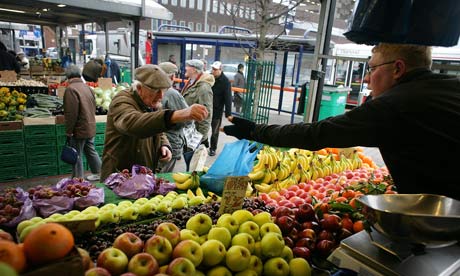
The chances of a man getting bowel cancer have doubled since the 1970s, according to the UK's biggest cancer charity.
In 1975 one in about 29 men was diagnosed with bowel cancer, but by 2008 that figure had risen to almost one in 15, says Cancer Research UK. The rate among women has also risen, although not so steeply, from one in 26 to one in 19.
The statistics were published as a second charity voiced concern over what it called "startling variations" in diagnosis and treatment outcomes in ovarian cancer. The charity, correctOvacome, pointed out that women were more likely to survive if ovarian cancer was detected early on, yet more than a quarter of patients had had to see their GP twice before being referred to hospital for diagnostic tests.
Cancer rates are generally rising because people are living longer. But bowel cancer is strongly linked to diet and many cases are preventable.
"There are many ways that people can cut their own risk," said Sara Hiom, director of health information at Cancer Research UK. "You can reduce your risk of bowel cancer by keeping a healthy weight, being physically active, eating a healthy diet that's high in fibre and low in red and processed meat, cutting down on alcohol and not smoking. It's also important to take up the opportunity to take part in bowel screening when invited."
Cancer Research UK says the figures are more accurate than in the past and arrived at through a new methodology, revealed on Wednesday in the British Journal of Cancer, that takes account of people who might get a recurrence of cancer and who would, in the past, have been counted twice.
It also allows for the age when a cancer poses a particularly high risk – somebody, for example, who has not been diagnosed with bowel cancer by the age of 70 is much less likely to get the disease than someone who is 10 or 20 years younger. Many more people survive than did previously. Half of all patients diagnosed with bowel cancer now survive the disease for at least 10 years – double the number who would have done so in the early 70s (about 23%).
The figures show that men are generally more likely to get cancer than women; 42.2% develop the disease compared to 38.8% of women.
Ovacome is concerned that women with ovarian cancer get faster diagnosis and more successful treatment in some parts of Britain than in others. According to a national survey report by the National Cancer Intelligence Network, only 38.1% of gynaecological cancer patients connected to St George's Healthcare NHS trust, south-west London, thought they were seen by doctors as soon as necessary. This compared with 90.5% of similar patients being treated at the Central Manchester University Hospitals NHS foundation.

